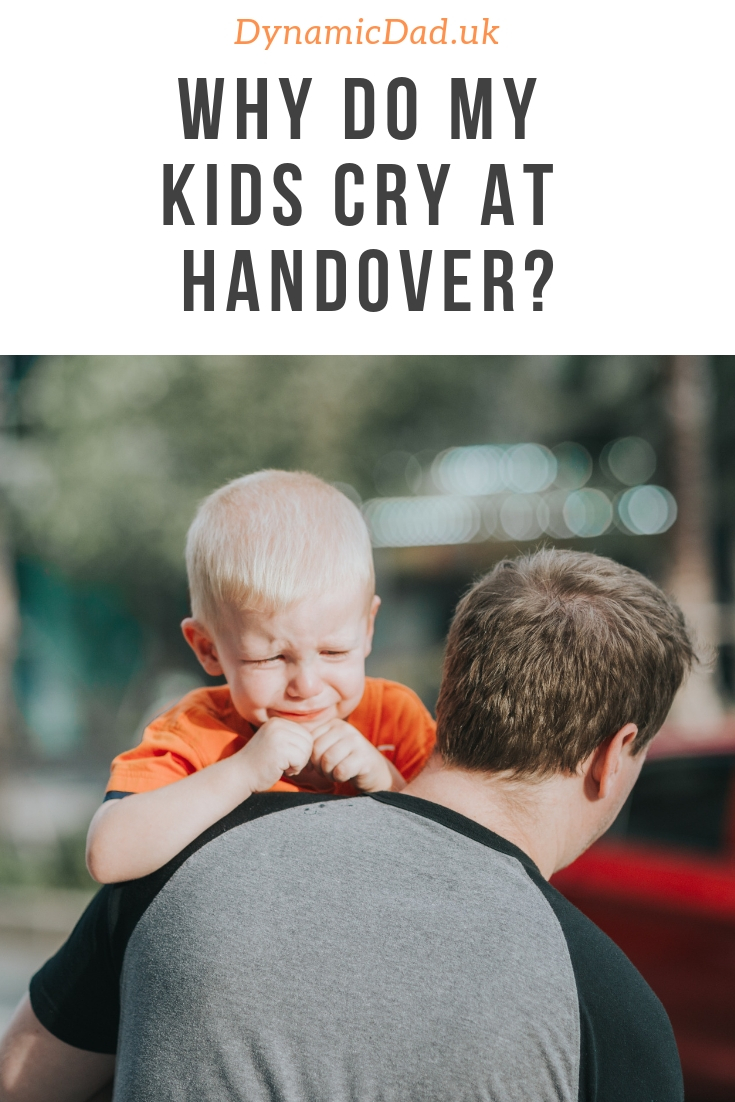Why my child cries at handover (and yours does too)
For a while, and what felt like forever at the time, my daughter would cry, sometimes uncontrollably, at handover between her mother and me.
It was heart-wrenching for all three of us, and both parents were casting aspersions and blame (and not always silently to ourselves).
Almost always, the tears would dry up within a few minutes with the other parent – whichever way our daughter was going.
But why?
Many a parent has had to cope with an upset, clingy, screaming blue murder child who cries at handovers, or just stubbornly refuses to go.
You’re not the first, neither were we, and collectively we won’t be the last either.
Similarly, many parents have wondered why their child cries after visitation, why their child doesn’t want to go home, or why a child doesn’t want to see their dad (or mum).
Parents on both sides will be asking the same questions…
- Is it me?
- Is it them?
- What have they done to cause this?
- What have I done?
- Why don’t they want me?
- Why are they scared of them?
…and many similarly negative and critical thoughts of both themselves and the other parent.
They’re not healthy thoughts and can be destructive to positive relationships all round. This is how we’re naturally wired though, so a little understanding goes a long way to breaking the cycle.
So why does my child cry at handovers?
Children are emotionally sensitive, especially during and after a breakup and as their parents, we need to be very aware of this – no matter how strong they appear to be.
From the child’s perspective, divorce & separation is an extremely traumatic event. To them it can be a similar to losing a parent completely.
Some may well feel that is exactly what’s happening at handover, that they’ll never see one or other parent again.
Equally, emotions can be overwhelming when you see someone you love but thought you may never see again.
How would you react if you saw a friend, relative or family member you thought you’d lost forever? I’m willing to bet there’d be tears involved.
Of course, there is always the prospect that legitimate fear is involved. While I in no way wish to play this down, perfectly normal and healthy emotions can cause overwhelm and one should not be misinterpreted as the other.
While painful for the children and the parents, everyone will adapt. Some will take longer and/or need more support than others, but in very few cases is “protecting” the children by avoiding or stopping contact the right approach.
The effect of age
Young children will often experience a separation anxiety when switching from the care of one parent to the other.
They already feel they have ‘lost’ one regular, familiar loving face from their lives, it is only natural for them to fear that their other parent may not return either.
They don’t yet understand the concept of daddy time and mummy time emotionally, even if they appear to understand intellectually.
Preschoolers with some awareness but limited understanding of the wider world can’t comprehend why anyone would leave the safety of the family unit & home.
They have real fears for the well-being of their other parent away from ‘home’, as well as for themselves. It is only a fear of the unfamiliar, but to them it is significant.
Older children still will be reminded that their once secure family is broken and can’t be fixed, while teenagers may rebel against the perceived abandonment or wrongdoing, fuelled by hormones too.
There are plenty of adults in the world who struggle to cope with events outside their control, we cannot expect our children to fare any better.
Physiological, psychological and emotional needs
We should also remember that children will typically thrive on attention – positive or negative – and that as negative behaviours typically attract more attention, there is a good chance they will indulge in them.
This may or may not be intentional on their part, but it is nevertheless true – bad behaviour generates more attention, and attention is what they need and want.
Tired & hungry children have less emotional stamina – as, really, do all of us. We all know someone who gets “hangry” or emotional when tired, and we’ve all been there ourselves in one way or another.
Many parents get worried, stressed & anxious about handovers and seeing their former partner. Children will feed off these emotions as well as having their own to process.
It is little wonder that children cry during handovers when exposed to this many stressors and potential for overwhelm.
Can we really expect them to handle it like adults?
Other situations where children are upset at handover:
Lets move away from children upset at handovers between separated parents for a moment, and consider other situations where our children may react in a similar way:
Some children become upset at being left with a childminder or a grandparent.
Some children get emotional when being collected from a friends’ house after a visit or overnight stay.
Children often suffer anxiety over their first days at nursery or school, and there are many, many forum threads and blog posts discussing it.
Even leaving a play park, shop, or friends house can elicit screams that would embarrass Genghis Khan.
Have you ever experienced a child throwing a mega-tantrum because they want something in the shop that you’re not willing to buy?
These are situations we as parents accept as perfectly normal, and in our collective experience the tantrums don’t last long, kids get over it, and we can recover with a G&T later.
As separated parents, we need to realise that when our child is upset at handover, it is as normal as the situations above, it won’t happen every time, and they will get over it in time.
Ultimately, our children, like ourselves, experience some level or form of anxiety when exposed to change.
It is our job as parents to help ease that anxiety, not to feed into it.
Misconceptions about children who are unsettled with the other parent:
With the above firmly in mind, let’s address some common misconceptions.
- The other parent is mean/abusive/emotionally manipulative.
- The other parent is a “Disney” mum/dad.
- The child is scared/hates going.
- The child is being coerced.
- The shouldn’t be subject to the stress of handovers.
I’ve seen all of these and many similar variations thrown around parents’ forums as well as by people close to me (and not so close any more) regarding handovers of my own daughter.
While there is the possibility that any of the above could be true, the probability is that in the vast majority of cases they simply aren’t.
It is so sad and unfair to many excellent and loving parents that as a society we automatically assume the worst of someone, and make accusations such as these when a child cries at handover.
It is wholly unfair to the child to be denied access to a safe and loving parent simply because they are upset about change.
We otherwise accept that a child must go to school or anywhere else and that they, with our help, will work through their emotional reluctance.
Why then, do we jump to these accusations of the other parent? Is it our own ‘coping mechanism’ that encourages us to cast blame, rather than accept the normal emotions of life?
Of the above misconceptions, the only statement I agree with, with modification, is: The child shouldn’t be subject to stressful handovers. There are so many things that both parents can and should do to make handovers less stressful and I’ve listed a few suggestions later.
Our prejudiced relationships:
If your child cries at handover when they see your ex (or you), it doesn’t mean anything more than they’ve acknowledged a change is coming. It doesn’t mean anything bad about the other parent.
It is so very important that we as parents let go of our prejudices as ex partners.
We almost need to consider ourselves, and them, as multiple separate people. Many of us already do this – we have our ‘work’ personality and our ‘home’ personality, our ‘family’ and ‘friends’ personas.
We should also accept that we each have our own ‘parent’ self that is separate from our ‘relationship’ self.
What this means is that while your ‘relationship’ self may not like, trust or even care about your ex’s ‘relationship’ self, we must acknowledge that they have a ‘parent’ identity too.
This parent identity wants to ensure the best for their child, to be able to love and protect them, to help them learn and grow – just as yours does.
You both brought a human being into this world, and the reason your child cries at handover is due to change and little more.
You both, as parents, share the same concerns over the welfare of your child.
Just as when your child calms down after a few minutes with you, they will calm down with their other parent too. For some it may take longer than others, but it will happen when you allow it.
My child cries at handover – what can I do about it?
Now that we understand that it has little to do with either ourselves or the other parent, what can we do to help our child get over the anxiety of handover?
I share several proven suggestions below, not all are possible for everyone, but there should be some good takeaways for most parents…
Routine event handover.
Use an event or location where only one parent need attend, for example school or a club.
This way, pick up or drop off becomes a normal routine event – going to school or going home, without the emotional stress of seeing and having to ‘choose’ from both parents.
Drop off, don’t pick up.
At either home, children will normally be occupied in a game, TV show, homework, chores or anything else. They are also in a comfortable environment & company.
Picking them up means interrupting something to take them away from those comforts.
Instead, drop off. This means the child stays with the same parent, who manages the end of the activity, until they arrive with the other parent.
This normalises the handover to the same level of event as being dropped off with friends or at school.
Both parents dropping off maximises useful bonding and activity time with each parent, equalises effort required, and ensures minimum disruption and anxiety for the child.
Be firm, encouraging & specific.
In the same way as you would ensure a child brushes their teeth or goes to school, no matter how emotional they or you are about it, be firm about their spending time with the other parent.
Respecting boundaries early in life is important, spending time with both parents is important, so it makes sense that a boundary to this effect should be set.
“It’s [other parent] time now, go and have fun and I’ll speak to/see you [at specific time]”.
For this to work, you must be specific and you must deliver.
If you say you will call at 6, call at 6. If you say you’ll see them after school on Monday, make sure you are there to pick them up – not someone else because your meeting overran.
It is also your responsibility to set and enforce this boundary. It is not up to the other parent to say “It is my time now, come on, let’s have some fun”.
You must demonstrate to your child that time with the other parent is valuable and that you are encouraging it. For your child’s well being, you must never allow them to feel they are being taken.
Be prepared & communicate.
Handovers are stressful for everyone involved. Make sure you are prepared for both sides of the event.
When ‘”delivering”, have bags packed in a consistent way and in as few as possible. This minimises time and ensures that the hairbrush, teddy or favourite toy can be located quickly and easily.
When “receiving”, have a clear plan and a means to follow through. Make sure decisions are made or appropriate choices are available depending on the child. Have healthy snacks, comforters or activities available.
If possible, try to duplicate some items across both households, so that wherever the child is, they have the ‘right’ hairbrush, toothbrush etc.
If your child has demonstrated a new preference for something, let the other parent know in enough time for them to do something about it, or loan it for the duration of the exchange.
It is not about “helping” the other parent. It is about helping your child be comfortable, whether they are with you, them, on a school trip or at a sleepover.
Distract, don’t bribe.
Know what interests your child and have something ready, whether that’s singing a song, playing “I spy”, a puzzle or a familiar toy to divert their attention.
Don’t try to bribe your kids with “if you… we can… [reward]”. It is important they associate the time with each parent for the value it provides, not the reward they receive afterwards.
Bribes also put you at risk of becoming the “Disney” parent. It isn’t a game of one-up.
One or other of you may be able to provide “more” for your child, but when your child senses the competition (and they will) you risk losing their respect & teaching them that being disrespectful is acceptable.
Deliver your child as you’d expect to receive them.
I.e. well rested, not full of caffeine or sugar, fed if after dinner or appropriately hungry if approaching a meal time.
Consideration for these small details will go a long way with the other parent, as well as with your child.
Imagine how they would feel if they always missed out on a roast dinner because you insist on them snacking with you before handover.
Things you shouldn’t do:
As with all do’s, there are some don’ts.
The following can have a detrimental impact on your child and should be avoided by both parents. Yes, that includes you, too.
Don’t pry into their time with the other parent.
It is normal to ask about their week or weekend, but just as school is always “OK” and no more, don’t be offended if they don’t want to discuss their life without you.
Pressuring for information will make your child feel uncomfortable, they have a bond with and respect for the other parent. Don’t ask your child to undermine that.
Don’t play on their fears, make it about you, or blame someone else.
Saying things like “I don’t want you to go, but [other parent/court] says you have to”, “I’ve missed you so much! I’m so glad you’re home” etc. can have a significant and cruel impact on your child as well as the other parent.
Allow them to love both parents, don’t guilt them into choosing one or demand that they validate your importance.
Don’t withhold information from parent or child.
If you’ve been told the other parent will be late, relay the message to the child. Don’t leave them to feel abandoned, they haven’t been.
If you’re running late, tell the other parent. They have a life to manage around you, and quite possibly a child to entertain until you get there.
Don’t try to control their time, interaction & relationship.
Everyone fares better when they are allowed to control themselves, their relationships and interactions with others.
This applies to your kids as well as their other parent.
Yes, they will make mistakes. So will you. Let them.
There are some interesting posts here and here on how dads, in particular, fare much better when mum backs off and lets him be a dad of his own design.
And finally, always:
Put the shoe on the other foot.
Whatever you are thinking about your child getting emotional at handover, the other parent is having similar thoughts.
If you wouldn’t accept them saying or thinking something about you, you have no right to assume that of them.
If you wouldn’t be happy if you were on the receiving end of your proposal, don’t expect them to be.
Parenting after separation is hard, don’t make it harder than it needs to be.
Consider their perspective too, put your child truly first, and accept that kids cry for no reason at all. Whether they cry at handover or because there’s too much milk in their cereal has nothing to do with anything else.
Why did my child cry at handover?
Because of all of the above, same as yours.
Does she cry now?
No, she’s excited to see the other parent, whichever way she’s going.
Do we have a great relationship?
Me & my daughter, yes! The other parent? No, unfortunately not. Not yet, at any rate.
Knowledge is power, and hopefully now you understand that it’s not your fault, or theirs. That your child(ren) will be ok and the best you can do is to support and encourage contact, and to talk reassuringly with them.
There are a number of books worth reading, I’ve listed a few here – that can help you help your kids through what is most certainly a difficult time.
If you’ve enjoyed this post, you may also like:
- The best books for Co-Parenting after separation
- How to help your kids thrive in two homes after divorce
- Your ex is not a narcissist… and you are not a victim











What an interesting read. It’s always interested me how separated parents do things. It must be hard on the children.
Great post!
Thanks Stephen, yes, it’s pretty tough on everyone – although there are so many little things that can be done to make life easier all around!